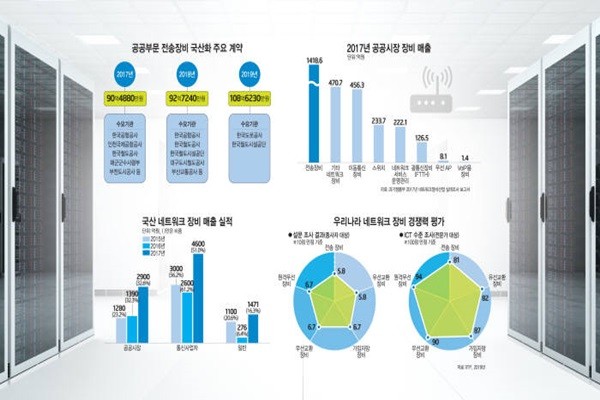South Korean network equipment is being used more within public sectors.
In the past, global businesses had practically monopolized network equipment in South Korea.
However, competitiveness of domestic network equipment has increased due to development of relevant technologies by South Korean businesses along with government support.
Experts suggested that there need to be consistent and long-term investments to vitalize domestic equipment as network equipment is set to face revival period through 5G mobile network and the Fourth Industrial Revolution.
◊Public sectors introduce domestic network equipment one after the other
Public sectors were thoroughly dominated by foreign businesses as they were seen as ‘graveyards for domestic network equipment’. However, there have been cases where South Korean businesses win large-scale bidding wars.
In 2017, Korea Airports Corporation, Incheon Airport, Korea Railroad Corporation, Naval Logistics Command, and Bucheon City, Environment, Satisfaction, Technology purchased domestic network equipment.
In 2018, Korea Airports Corporation, Korea Railroad Corporation, Korea Rail Network Authority, Daegu Metropolitan Transit Corporation, and Busan Transportation Corporation purchased domestic equipment.
In 2019, Korea Rail Network Authority signed a contract and purchased domestic network equipment worth about $6.71 million (8 billion KRW) during first quarter.
A representative for Ministry of Science and ICT (MSIT) stated that many railroad facilities are made out of domestic products.
There is also an upward trend regarding size of annual contracts to purchase ‘transmission equipment, which is used the most out of every equipment of public agencies. Size of contracts increased from $7.55 million (9 billion KRW) in 2017 to $7.80 million (9.3 billion KRW) in 2018 and it currently stands at $8.47 million (10.1 billion KRW) in 2019.
According to MSIT’s investigation on South Korean network equipment manufacturers, percentage of sales of domestic equipment is on an upward trend within public markets.
Entire sales of domestic equipment within public markets increased from $107 million (128 billion KRW) in 2015 to $117 million (139 billion KRW) in 2016 and to $243 million (290 billion KRW) in 2017. Percentage of sales also increased from 23.2% to 32.3% and to 32.6% respectively.
Number of actual demands is on a rise. According to MSIT, amount of demands for network equipment within public sectors for 2019 is $188 million (223.9 billion KRW), which is 30.8% higher than that of last year.
◊South Korean network equipment manufacturers need support from South Korean Government
In the past, fact that technical skills in network equipment were lower than that of foreign businesses was an obstacle.
As a result, public sectors preferred foreign equipment due to reasons such as compatibility and stability.
Some public agencies did not use domestic equipment at all while presenting ‘over-specifications’ that excessively request high specifications such as function and capacity. Some even presented specifications that are only met by particular foreign equipment.
Network equipment industry and South Korean Government have put in efforts to improve such practice.
Their starting point came in August of 2010 when South Korean Government put out strategies to develop IT network equipment industry.
Since 2014, South Korean Government has been investigating and announcing current status of domestic ICT (Information Communication Technology) equipment within public sectors.
It designated appropriate types of businesses for certain equipment and started solving over-specification issue within bid proposals.
South Korean Government created a standard for calculating size of equipment to establish network with TTA (Telecommunications Technology Association) and KANI (Korea Association of Network Industries). This standard defined the concept for calculating equipment size and presented reasonable size that is objectified.
As a result, practices such as requesting over-specifications or carrying out over-investments started to disappear resulting in more opportunities for South Korean businesses. These practices were seen as practices that were favorable for foreign businesses that develop equipment with large capacity.
Since then, South Korean businesses have been focusing on raising their technical skills.
“We are putting in much effort to develop products that satisfy requirements of our suppliers.” said a representative for network equipment industry. “We are also raising our service standard related to maintenance, which is one of strengths of South Korean businesses.”

◊Experts Ask for Consistent Political Support from South Korean Government
Possible conflict with WTO (World Trade Organization) is the reason why it is difficult to increase percentage of domestic network equipment within public sectors all at once.
It is not possible for a government to eliminate foreign products and publically pressure domestic businesses to purchase domestic products.
Experts pointed out that South Korean Government’s support should be consistent and not temporary.
“South Korean Government must guarantee products that are designated as small and medium-business items by Public Procurement Service.” said Professor Kim Nam of Chungbuk National University. “Since reasonable price is not the only important issue within public sectors, South Korean Government must reject below-cost biddings.”
Some also point out that network equipment industry must make continuous investments and that South Korean Government must support network equipment industry with their investments.
“South Korean Government must provide support so that small and medium manufacturers can develop innovative technologies together and share important technologies with each other.” said Professor Shin Min-soo of Hanyang University. “Another plan is to have large corporations and small and medium businesses work together to develop relevant technologies and support small and medium businesses to enter markets by fighting off foreign equipment manufacturers together.”
Network equipment industry believes that there need to be more opportunities for South Korean businesses to make more references.
“It is important to have more opportunities for network equipment industry.” said an executive within network equipment industry. “Bold policies and development of relevant systems are also needed.”
“Although percentage of domestic equipment used by public sectors has increased compared to the past, small and medium network equipment manufacturers continued to complain that their products are beat out by foreign products.” said Byun Jae-il who is a member of The Minjoo Party of Korea. “We need to vitalize our telecommunication equipment industry by introducing telecommunication equipment by small and medium businesses into public sectors.”
Staff Reporter Jung, Yaelin | yeslin@etnews.com